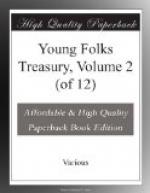AEneas now climbed one of the hills to see whether he might catch a glimpse of any of the missing ships. Not a sail was in sight, but in the valley below he spied a herd of deer grazing. Here was better food for hungry men. Drawing an arrow from his quiver, he fitted it to his bow, let fly, and a mighty stag fell to his aim. Six others shared its fate, then AEneas returned with his booty and bade his friends make merry with venison and Sicilian wine from the ships. As they ate and drank, he tried to hearten the Trojans. “Endure a little longer,” he urged. “Think of the perils through which we have passed, remember the dreadful Cyclopes and cruel Scylla. Despair not now, for one day the memory of past sufferings shall delight your hours of ease. Through toils and hardships we are making our way to Latium, where the gods have promised us a peaceful home and a new and glorious Troy. Hold out a little while, and wait for the happy days in store.”
HOW HORATIUS HELD THE BRIDGE
ADAPTED BY ALFRED J. CHURCH
King Tarquin[1] and his son Lucius (for he only remained to him of the three) fled to Lars Porsenna, King of Clusium, and besought him that he would help them. “Suffer not,” they said, “that we, who are Tuscans by birth, should remain any more in poverty and exile. And take heed also to thyself and thine own kingdom if thou permit this new fashion of driving forth kings to go unpunished. For surely there is that in freedom which men greatly desire, and if they that be kings defend not their dignity as stoutly as others seek to overthrow it, then shall the highest be made even as the lowest, and there shall be an end of kingship, than which there is nothing more honorable under heaven.” With these words they persuaded King Porsenna, who judging it well for the Etrurians that there should be a king at Rome, and that king an Etrurian by birth, gathered together a great army and came up against Rome. But when men heard of his coming, so mighty a city was Clusium in those days, and so great the fame of King Porsenna, there was such fear as had never been before. Nevertheless they were steadfastly purposed to hold out. And first all that were in the country fled into the city, and round about the city they set guards to keep it, part thereof being defended by walls, and part, for so it seemed, being made safe by the river. But here a great peril had well-nigh over-taken the city; for there was a wooden bridge on the river by which the enemy had crossed but for the courage of a certain Horatius Cocles. The matter fell out in this wise.
[Footnote 1: King Tarquin had been driven from Rome because of his tyranny.]




